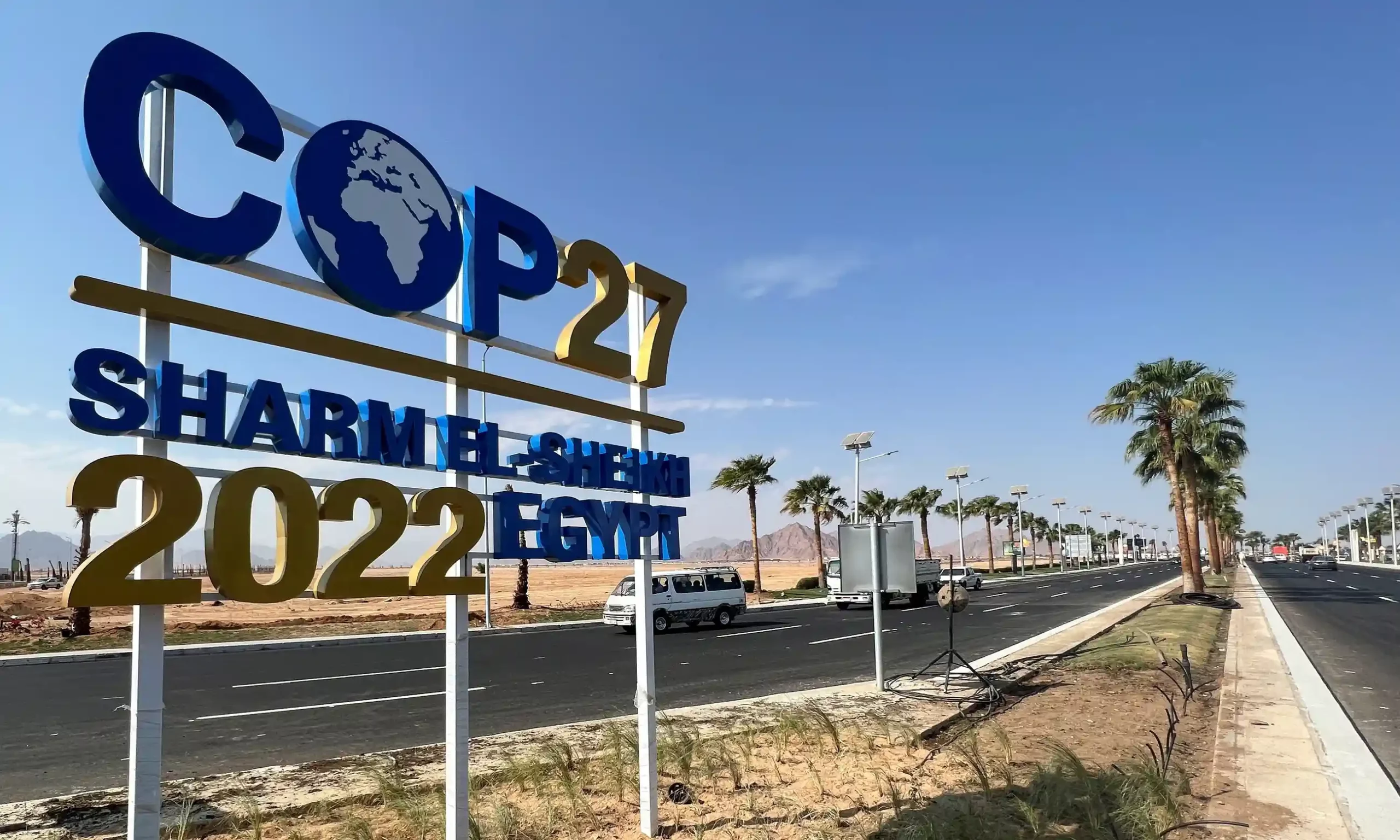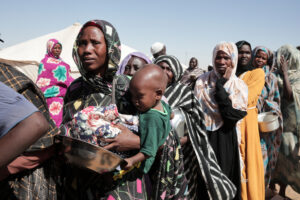Egypt Just Hosted the World’s Largest Climate Talks – COP28 Must Build on That Progress
This year’s conference in Dubai can, and should, address COP27’s shortcomings by further advocating for the Middle East’s environmental security and confronting the root causes of global warming.

Image Credit: Sayed Sheasha/Reuters
Last November, world leaders, climate activists, investors, and diplomats swarmed the resort town of Sharm El Sheikh, Egypt, for the United Nations Climate Change Conference (COP27). The conference, which was billed as the “implementation COP,” had the goal of implementing mitigation and adaptation measures as well as investing in renewable energy to fulfill prior financial commitments to climate obligations. The discussions concluded with a historic agreement to finance the countries most devastated by the consequences of climate change. Yet, the conference also billed as the “African COP,” concurrently spotlighted underrepresented voices in the international climate dialogue – including those of its host country.
Like much of the Middle East, Egypt is a microcosm of the environmental perils that plague the Global South, from increasing temperatures and rising sea levels to intensified weather patterns and food shortages. COP27 offered a mixed bag of outcomes in addressing these challenges. The summit was applauded for successfully establishing a dedicated fund for loss and damage, but it also received criticism for not accomplishing nearly enough. For its host country, the COP27 presented some modest wins for Egypt’s climate interests. This year’s conference in Dubai can, and should, address COP27’s shortcomings by further advocating for the Middle East’s environmental security and confronting the root causes of global warming.
Advantageous COP27 Provisions for Egypt: Food, Energy, and Water
Indeed, COP27’s location placed Egypt’s stake in the climate change crisis front and center. Despite accounting for only 0.35% of historical carbon dioxide emissions, Egypt today endures unprecedented heatwaves, droughts, and storms. Such climate-induced phenomena, which disproportionately burden countries of the Global South, pose significant threats to Egypt’s future development and security.
In recognition of these pressing challenges, Egypt launched the Nexus of Water, Food, and Energy (NWFE) Program in July 2022. Supplementing the country’s national climate strategy, the initiative intends to bolster Egypt’s green transition and hone in on three fundamental areas of pertinent environmental concern: water, food, and energy resilience. Specifically, NWFE creates mechanisms for Egypt to mobilize investments worth $14.7 billion, according to the country’s Minister of International Cooperation, Rania Al-Mashat. These investments are divided into $10 billion to replace existing thermal power plants with renewable energy sources, $3.35 billion to modernize farming practices and stimulate food security, and $1.35 billion to secure water resources through efficient irrigation and desalination strategies. Thanks to its ambitious goals, NWFE garnered international support at COP27. The conference also announced several initiatives that target the effects of global warming on water, food, and energy and have the potential to further enhance Egypt’s environmental well-being.
Food Security
COP27 took key steps to undertake one of Egypt’s most pressing climate concerns: food security. The Egyptian COP27 Presidency and the UN Food and Agriculture Organization (FAO) announced the newly-launched Food and Agriculture for Sustainable Transformation (FAST) initiative, to enhance access to climate finance and generate resilient agrisystems by 2030. The FAST initiative aims to align agricultural projects and needs with donors to ensure that finance flows reach vulnerable areas while developing a roadmap for food-related research and innovation. Exacerbated weather patterns reduce agricultural yields and damage crops – outcomes that pose critical challenges in already food-insecure regions.
Egypt’s diminishing crop yields, which may cost an estimated $1.84 billion per year without significant adaptation measures, could benefit by partaking in the initiative’s agricultural financing system. It may particularly stimulate a more resilient Egyptian agricultural sector by enhancing the country’s ability to assess climate change’s food impacts with knowledge-sharing platforms. From there, it can adopt recommended approaches that supplement long-term food security. This is especially relevant as the country feels the reverberations of the Russia-Ukraine War. The conflict has caused cereal prices to reach virtually unsustainable levels, and Egypt now faces a severe wheat shortage. Although its exact benefits remain uncertain, the FAST initiative can support Egypt’s capacity development, agricultural metrics, and financing mechanisms needed to reform the country’s fragile food systems and encourage agriculture resilience.
Energy Goals
COP27 also made headway in prioritizing Egypt’s energy targets. Negotiations recognized the need for development partners and multilateral institutions to aid Egypt’s transition away from fossil fuels and adopt renewable alternatives. Most notably, the European Bank for Reconstruction and Development (EBRD) committed more than $1 billion in private renewable finance, sovereign finance, and grants to promote Egypt’s implementation of clean energy frameworks. The United States, Germany, and other European nations likewise pledged more than $500 million. The joint U.S.-Germany agreement specifically commits to “mobiliz[ing]additional funding and financing” to accelerate fossil fuel reductions across transport, gas, and waste sectors, with the goal of eventually attaining Egypt’s net-zero carbon dioxide emissions target. Such finance commitments aim to strengthen Egyptian energy resilience through investing in green technologies (such as solar panels and renewable hydrogen), expanding sustainable transport options, and retiring carbon-based energy systems. Although the country has emerged as a major regional supplier of natural gas since the Russia-Ukraine War upended prices, the new funds may provide avenues for Egypt to embrace renewable energy production.
Water Scarcity
Finally, COP27 generated a potential mechanism to help alleviate Egypt’s chronic water scarcity. The World Resource Institute, public and private sector partners, and development banks launched the African Cities Water Adaptation Fund (ACWA Fund). The initiative seeks to leverage at least $5 billion in funding and financing to implement strategic, environmentally-sound projects in 100 African cities by 2032. Specifically, the Fund will provide city leaders with the knowledge and resources necessary to scale water-resilient solutions across Africa’s urban zones. It also will supply them with information and risk assessment tools to better understand local climate and water risks and support community stakeholders through projects – including rainwater harvesting, wastewater treatment, and sanitation systems – that provide low-carbon, sustainable solutions to water scarcity. Stagnant, environmentally-unfavorable negotiations over the Grand Ethiopian Renaissance Dam with Sudan and Ethiopia and climate-induced increases in salinization levels have exacerbated Egypt’s water crisis, even as urban systems expand. The ACWA Fund might support Egypt in mobilizing water resilience amidst irreversible climate change and unresolved geopolitical disputes.
Looking Ahead: COP28 Must Address the Root Causes of Climate Change
COP27 made much-needed advances toward addressing its host country’s climate challenges – namely, food, water, and energy security, as demonstrated by the objectives of NWFE. Echoing President Abdel Fattah El Sisi’s calls for financial accountability mechanisms, the conference established several initiatives that recognize global climate liabilities and ultimately might support a more resilient, adaptive Egypt. Although present funding is still insufficient to adequately support mitigation efforts and must be increased, these accomplishments lay a vital groundwork upon which subsequent COPs can build.
Indeed, this year’s conference presents an opportunity to continue advocating for Egypt’s representation in the discussions regarding environmental challenges. COP28 could further amplify the voices of Middle Eastern nations that are disproportionately enduring the detrimental impacts of climate change, including heightened desertification, heat waves, and sea level rise. Its location in Dubai can draw attention to the region’s unique environmental perspectives to advocate for funds and adaptive strategies that remedy these challenges; it can also place greater focus on the cascading effects of climate change, such as displacement, violent conflict, and political unrest, that compromise regional security. For all the potential gains COP28 may yield, a significant hurdle obstructs climate justice not only for Egypt but for all countries bearing the brunt of global warming. COP28 can ultimately attempt what previous COPs have historically been skirting around: confronting the sources of accelerating climate change by curtailing fossil fuels and reducing greenhouse gasses through enforced regulations. Although this effort was squashed at COP27 due to stalling leadership by wealthy nations and mounting pressure from fossil fuel lobbyists, COP28 must culminate in a global commitment to phase out of fossil fuels – and thus reduce carbon emissions – if it is to rectify climate inaction’s effects in the Middle East and the world.
Clara Apt is a third-year undergraduate student at New York University’s College of Arts and Sciences and serves as an Assistant Editor at Just Security, a publication focusing on foreign affairs, human rights, and democracy within the NYU School of Law. She worked as a research analyst at the US Institute of Peace during the summer of 2023 and is pursuing a double major in International Relations and Middle Eastern Studies. Her interests encompass global governance, human rights, and climate policy.




